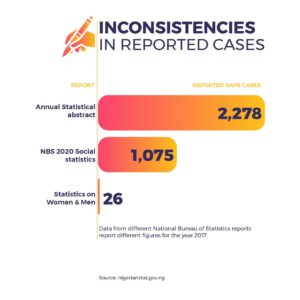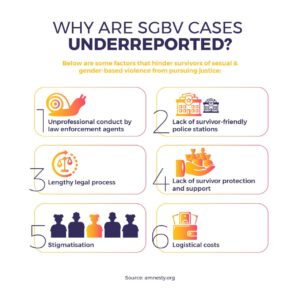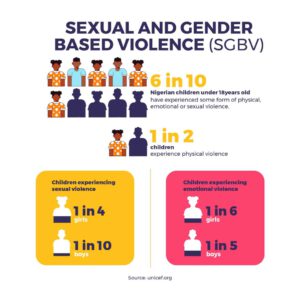Emiene Erameh sheds light on systemic flaws in Nigeria’s police force’s handling of gender-based violence (GBV) cases.
In June 2021, fourteen-year-old Keren-Happuch Akpagher died after allegedly being raped at her boarding school, sparking outrage due to the circumstances and the challenges faced in seeking justice.
Keren’s mother, Mrs Vivien Vihimga Akpagher, revealed that she died from sepsis and complications from a condom left inside her body. The school, Premier Academy Lugbe, denied these allegations, asserting that Keren died from diabetes complications.
Human rights activist Lemmy Ughebe of the advocacy group Make a Difference (MAD) took up Keren’s case, accusing the school of concealing similar incidents in the past.
Ughebe filed a complaint with the Federal Competition and Consumer Protection Commission (FCCPC) against the school. The police, however, displayed reluctance to investigate and were accused of bias because they provided the school with the autopsy report but denied Keren’s mother this information, forcing her to file a Freedom of Information request to get it. The police also provided the school with information it used to apply to stop the investigation by the FCCPC and failed to secure crucial CCTV footage from the school’s 54 cameras, essential for thorough investigations. There was no sanction from the police when the school admitted to deleting the footage.
Multiple victims face obstacles while seeking justice in cases of sexual violence. Challenges include police officers demanding bribes, conducting shoddy investigations, and attempting to compromise cases. As a result, many cases go unreported or unresolved.
While Nigeria designates the police as the primary responders to gender-based violence (GBV) cases, the lack of proper equipment, training, and victim-friendly procedures hampers effective response.
When someone reports a case to the police station, an officer is assigned to the case. To establish a claim of sexual violence, a medical examination is needed. At the hospital, survivors have a right to decide whether to collect forensic evidence for pursuing legal action. The medical examination report is supposed to be free, but survivors are asked to pay a minimum of N2,000 for the form, which is used to file a report with the police. Survivors also contend with a lack of rape kits, used to collect evidence. The kits include a checklist, materials, instructions, envelopes and containers to package collected specimens.
After recording the survivor’s statement, police arrest the perpetrator and gather crucial evidence from the crime scene. The officers take the perpetrator’s statement and may detain them. Afterwards, they transfer the case to the Criminal Investigation Department (CID) for prosecution.
In theory, survivors of sexual violence can report to specialised units, but in practice, many encounter officers who lack knowledge about GBV laws. A World Bank study on GBV in Nigeria found that this gap in awareness affects the ability of police to handle GBV issues professionally, while an Amnesty International report highlighted the unprofessional conduct by law enforcement agents, the lack of survivor-friendly police stations and other barriers faced by survivors.
In one incident, 12-year-old Anita was assaulted by her neighbour. When Anita and her parents went to the Suleja Police Station, officers demanded that they implicate somebody else.
“Upon our arrival at the station, the rapist’s family was there. The police took my daughter to an office away from her father, brought out handcuffs, threatened to cuff her, and coerced her to name somebody else as her rapist,” said Anita’s mother.
When they refused to pay the settlement demanded by the police for identifying the ‘wrong’ person as the perpetrator, the rapist taunted the family, forcing them to move to another part of the city. The perpetrator remains at large.
Another incident in December 2018 involved the rape and murder of a 13-year-old schoolgirl. The Benue State Attorney General and Commissioner of Justice declared prima facie evidence against Andrew Ogbuja, a lecturer at the Benue State Polytechnic, and his son Victor Ogbuja. Andrew Ogbuja was arrested and charged with conspiracy, rape and murder, but was acquitted by a Makurdi High Court after the prosecution failed to prove the charges.
The police provided no evidence that Andrew Ogbuja and his son had raped the girl, while the prosecution presented inconsistent autopsy reports. The Federal Medical Centre in Makurdi indicated the death was due to ‘natural causes’ while the police forensic laboratory found the death was due to ‘injuries related to sexual abuse.’
“I cannot pick and choose which of the autopsy reports to rely on in reaching a just conclusion of this case,” said Justice Augustine Ityonyiman.
Andrew Ogbuja’s wife, Felicia, was however sentenced to five months in prison with no option for a fine, for threatening the girl, and telling her to keep silent, said Justice Mobolaji Olajuwon of the Federal High Court, Makurdi. Their son Victor remains at large.

Widespread corruption also hinders justice in GBV cases. A report by Human Rights Watch documented citizens, including GBV victims and their families, being asked to facilitate police to carry out their work. Police demand between N30,000 to N50,000 to investigate complaints and perpetrators often compromise the police to tip the scales in their favour. Police also don’t take action when perpetrators and their associates threaten and coerce victims and their families to withdraw the cases.
Ugbebe, the human rights activist, has received such threats.
“When I went to submit a petition to the National Human Rights Commission in the Keren-Happuch Akpagher matter, Department of State Services agents attempted to kidnap me. Channels Television captured the incident.
“They have hounded me, threatened my spouse and my family, all because of fighting to get justice for victims,” he said.
The masculinised culture within the police exacerbates these challenges. The core police training curriculum focuses on training officers for toughness to ‘fight criminals’, with an emphasis on parade, fatigue, bodybuilding, jungle training, early morning rising, lectures, and handling of guns. Gender issues and gender-based violence are not part of the core curriculum, and this affects their attitudes in handling GBV cases.
One study found that officers are hostile, and get irritated when survivors display vulnerability and blame, insult, mock or order them out of their offices. Moreover, gender activist Ene Ede, popularly known as Mama Gender, says it is common for police to victim-shame, refuse to record GBV incidents and put pressure on victims to settle the matter out of court.
After training, women police officers are assigned to handle cases concerning women and children, including investigation of sexual offences, recording of statements from female witnesses, female suspects and children, attendance when women or children are being interviewed by male police officers, searching, escorting and guarding of women prisoners to and from police stations, school crossing duties, and crowd control, where women and children are present in any numbers.
While this might be seen as making officers more responsive to GBV survivors, who are primarily women and children, it keeps men from seeking help out of fear of being stigmatised from the stereotype attached to the GBV units.
The negative attitudes of police who uphold patriarchal policing philosophies cause them to withdraw cases and prevent survivors from reporting incidents. These entrenched attitudes also affect policewomen who suffer discriminatory practices despite constitutional provisions barring gender discrimination.
Women are treated differently from men during training, and are not trained in handling firearms, effectively excluding them from ‘core police duties’ and denying them the honour, status and career advancement opportunities that come with these duties. Women are also recruited for the General Duties Branch and assigned office duties, including clerical, telephone, and office orderly duties. Despite these challenges, a few women have attained exalted ranks through hard and admirable work.
To end discrimination against female police officers and enhance the capacity of officers to handle GBV, the Nigeria Police Force launched a gender policy in September 2012.

In response to consistent civil society and public outcry on incessant violence against Nigerian women, the government also established the Family Support Unit (FSU) and gender office of the Nigeria Police Force. It signalled a change from indifference to brutalities often dismissed as domestic matters. The FSU has offices in 10 police stations in Lagos State. In 2015, the government established the gender office in the Lagos State police command to oversee the FSU.
In addition, the discriminatory provisions of the Police Act and regulation laws of the Federation Republic of Nigeria, 2004 that prohibited the recruitment of married women, barred policewomen from marrying without the consent of the police commissioner and required approval from the Inspector General of Police for re-enlistment after pregnancy, were repealed in 2020. Many officers, including the leadership, remain unaware of these changes and continue to discriminate against female officers, and the number of women in the police force has declined from 19.09% in 2016 to 9.75% in 2018.
The units tasked with handling GBV cases are also under-resourced compared to other ‘masculine’ units such as the disgraced Special Anti-Robbery Squad (SARS), which was renamed the Federal Special Anti-Robbery Squad, the Counter-Terrorism Unit, Arms and Ammunitions Unit, and Highway Patrol Unit.
The present police operations budget is N871.3 billion, with N3.52 billion for the central ministry’s operations. In contrast, the government gave the Nigerian Police Force N805.5 billion, N5.17 billion to the Police Academy, and N57.14 billion to the Nigerian Police Trust Fund. Lack of transparency makes it difficult to evaluate how much goes into the fight against GBV, but a policewoman at a Domestic Violence (DV) unit in Lagos told this publication that the gender units are considered unimportant.
“These other units are given many cars, have more money for fuel and are considered more important. They don’t count us as part of police work. They call us NGOs (non-governmental organisations),” she said, asking for anonymity to avoid reprisals from her superiors.

As a result, it is not uncommon for the police to demand “mobilisation fees” from citizens before they investigate cases.
National Publicity Secretary of the Committee for the Defence of Human Rights (CDHR) Gerald O Katchy argues that improving the welfare of police officers would minimise their vulnerability to bribery. Currently, police constable grade Level 03, the lowest-ranking officer, earns N43,293.80 monthly.
“Poor pay can lead to police officers attempting to boost their incomes with bribes or competing with criminals for dirty money,” said Katchy.
However, Ating Ewong, a journalist, says that the issues run deeper than resource allocation. She went undercover as a rape victim in December 2021 and revealed how police consistently fail victims of gender-based violence. She was repeatedly interrogated, victim-shamed and eventually asked to pay N2,000 to file a report.
To combat the issues that deny GBV victims justice, Nigeria should include compulsory training in gender-based violence in the police college curriculum. Police teams should include specialised personnel such as social workers, counsellors, educationists, traditional and community leaders, religious leaders, and lawyers for a comprehensive GBV response. Police stations should also have facilities to support and protect victims during interviews.
Establishing the GBV data situation room, which monitors the prevalence of GBV and related trends in Nigeria using data from police reports, healthcare facilities and civil society organisations, is a step in the right direction, because the data can be used for evidence-based policy formulation and implementation.
Gender disparities in the criminal and penal codes should be eliminated. For instance, in Section 353 of the Criminal Code, assault against a man is a felony with a jail term of three years, but in Section 360, assaulting a woman is a misdemeanour attracting a jail term of two years.
Further, Section 55 of the Penal Code permits a husband to beat his wife to correct her as long as he doesn’t inflict grievous harm, while Section 182 condones marital rape (any sexual intercourse by a man with his wife is not considered rape if she has attained puberty). This provision disregards sexual abuse of girls who have reached puberty.
Such provisions, which are inconsistent with the constitution, send mixed signals to police officers assigned to investigate and prosecute GBV cases.
While Nigeria ratified the Convention on Eliminating all Forms of Discrimination against Women (CEDAW) in 1985, it is yet to be domesticated close to four decades later.
“Domestic violence cases should be treated as criminal cases, and stiffer penalties should be imposed against offenders. The poor handling of GBV and the poor conviction record continue to deny victims justice and embolden perpetrators,” said Ede.
This report was supported by the Africa Women Journalism Project (AWJP) in partnership with the International Center for Journalists (ICFJ) and with the sponsorship of the Ford Foundation.